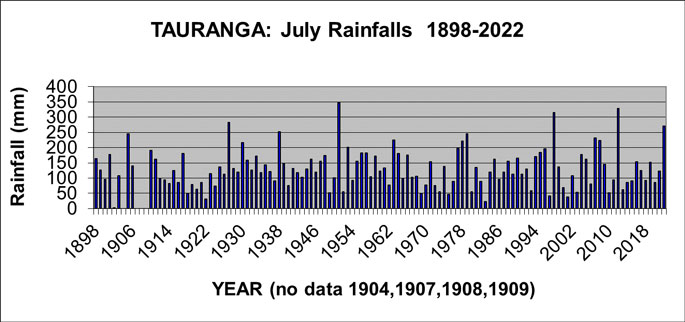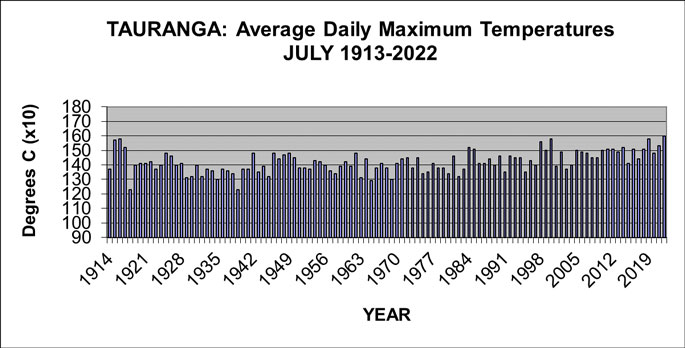 |
Weather Eye with John Maunder |
Rainfalls for the month of July have been recorded in Tauranga since 1898, except for 1904, 1907, 1908, and 1909.
The graph for the period 1898-2022 shows the range of rainfalls from an extreme high of 348 mm in 1951, to a low of only 2 mm in 1902.
The rainfall for July 2022 was 271 mm. The graph shows the second wettest July was 2012 when 328 mm was recorded, and the second driest July was in 1983 when only 22 mm fell.
The long-term average rainfall for Tauranga for July is 129 mm. The graph of the July rainfall shows ‘normal' variations from year to year.
There is a very small decrease in the overall July rainfalls during the last 50 years (1961-2010) from an average of 127 mm, compared with an average of 132 mm during the 50 years from 1911-1960.
Since 1898, there have been 14 July months with a rainfall of 200 mm or more, but only four July months with rainfalls of 40 mm or less.
The eleventh wettest July months (in chronological order) have been 1905, 1927, 1938, 1951,1963,1979,1988, 2007, 2008, 2012 and 2022. The ten driest July months ( in chronological order) have been 1902, 1918, 1922, 1949, 1969, 1975, 1983, 1997, 2001, and 2010.

Tauranga Average July Afternoon Temperatures 1913-2022
The graph below shows details of the average daily maximum temperatures, called ‘afternoon', for Tauranga for July from 1913-2022. The temperature for July 2022 was 16.0 degrees C the warmest on record.

It's very common for areas such as Tauranga to have had different observation sites during the years, and readings from the earlier sites have been adjusted to the present site using standard climatologically procedures.The temperature series described here is a record of what the temperature would have been if the current observation site, Tauranga Airport, had been used throughout the period.
It's important to note, in considering climate change, the methodology used in computing an official set of climate observations is very important as otherwise erroneous conclusions may be drawn.
Traditionally, temperature observations have been recorded with a set of maximum and minimum temperature thermometers.
These record the daily maximum temperature, usually recorded in mid-afternoon, and daily minimum temperature, usually recorded just before dawn.
This analysis of temperatures for Tauranga is for average daily maximum temperatures.
The long-term average afternoon temperature in July for Tauranga is 14.1 degrees Celsius, ranging from cool July months of 1918 and 1939, both 12.3 degrees Celsius, and 1965, with 12.9 degrees Celsius, to the warm July months of 2022, and the mild July months of 1916, 2010, and 2019 all with 15.8 degrees Celsius, and 1915 with 15.7 degrees Celsius.
The graph of the average afternoon temperatures for July shows generally normal variations from July to July in the last 109 years.
But several July months since 1997 have been a little warmer than average.
From 1913 to 2022, there have been nine July months with an average afternoon temperature of 15.2 degrees Celsius or more, and 11 July months with an average afternoon temperature of less than 13.3 degrees Celsius.
The ninth mildest July months for afternoon temperatures on record, in chronological order are: 1915, 1916, 1917, 1984, 1998, 2000, 2019, 2021 and 2022.
By contrast, the seven coolest July months for afternoon temperatures on record, in chronological order are: 1918, 1929, 1935, 1939, 1963, 1965, and 1969.
The average afternoon temperature for Tauranga for July for 49 years from 1914-1962 was 14.0 degrees Celsius, compared with the average afternoon temperature for Tauranga for July for 49 years from 1963-2011 was 14.2 degrees Celsius.
*********************************
For further Infomation about a wide range of weather/climate matters see my new book Fifteen shades of climate... the fall of the weather dice and the butterfly effect.
The book is available through the web site amazon.com. Just Google 'fifteen shades of climate” for details.
www.amazon.com/dp/B08NDR1GFD?ref_=pe_3052080_397514860

